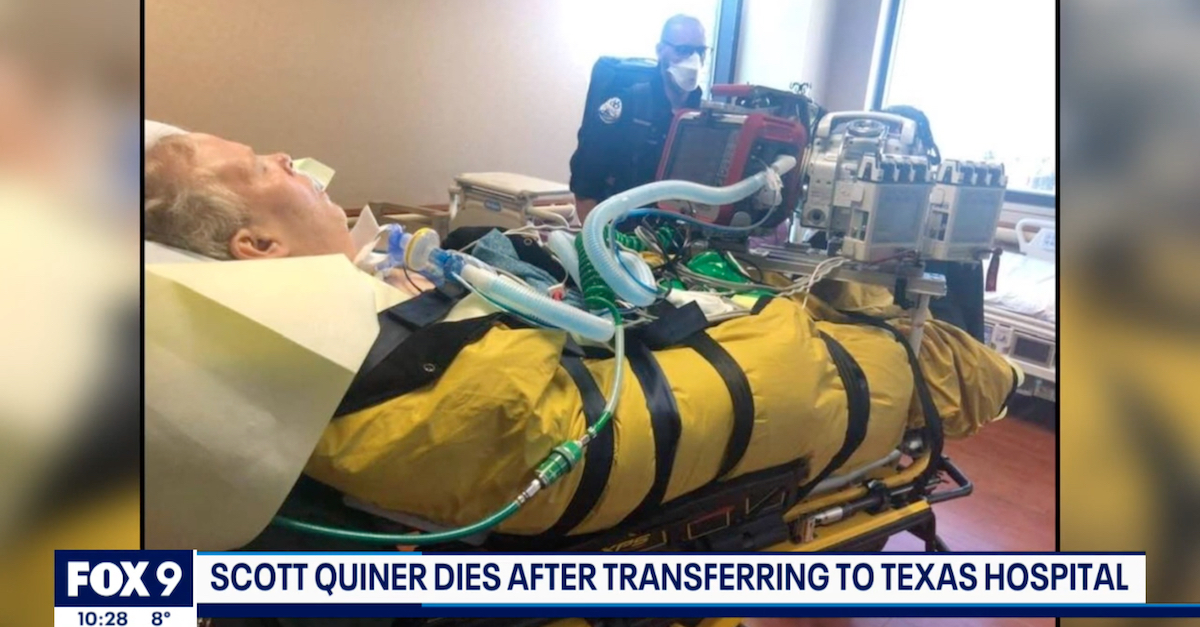
Scott Quiner, then alive but on a ventilator, appears in a KMSP-TV screengrab.
A Minnesota COVID-19 patient died less than two weeks after his wife filed a lawsuit to prevent a hospital from pulling the plug on life support measures, FOX affiliate KMSP-TV has reported. The man, Scott Quiner, 55, of Buffalo, Minn., died on Jan. 22 — Saturday morning — in Texas, his wife’s lawyer told the Minneapolis/St. Paul broadcast station.
As Law&Crime previously noted, court papers filed by wife Anne Quiner a little less than two weeks ago alleged that Scott was a patient at Mercy Hospital in Coon Rapids in Anoka County, Minn., when doctors threatened to withdraw life support. A Texas hospital reportedly agreed to accept Scott as a patient; he was transferred south via a medical flight but ultimately succumbed to the effects of the novel coronavirus, KMSP reported. The identity and location of the Texas hospital remans unclear.
The wife’s attorney spoke to the television station on behalf of Anne Quiner and her family to announce the news.
“I would like to extend their thanksgivings for the love and support they have received from the community, and request privacy for Annie and the children as they grieve the loss of Scott — a wonderful husband and father,” attorney Marjorie Holsten said.
KMSP further noted that Allina Health, which operates the Minnesota hospital from which Quiner was transferred, said it was “saddened to hear” about the former patient’s passing— “and our deepest condolences go out to family, friends and loved ones.”
“His passing marks yet another very sad moment as collectively we continue to face the devastating effects of the pandemic,” the hospital added.
Court papers filed two weeks ago tell some of the story, but as KMSP duly noted, the full scope of Scott Quiner’s medical condition has not entirely been made public. Anne Quiner alleged certain facts in court papers, but the case was not met with a full on-the-merits defense from the hospital because the litigation was early; the hospital was also barred by privacy laws from releasing records directly to reporters. KMSP’s Paul Blume tweeted that Scott was said by his family’s attorney to have been making “baby steps” before he passed; Blume said the attorney indicated that Scott took a drastic turn for the worse in the final 24 hours of his life. The attorney, per Blume, in part blamed “months of inadequate care” in Minnesota for Scott’s death.
Holsten reportedly said at the commencement of the case that doctors in the Lone Star State considered Scott Quiner “severely malnourished” after he arrived there from the North Star State.
The New York Times reported that Scott Quiner was unvaccinated; however, its source for that assertion was not immediately clear. The newspaper did note that Anne Quiner pleaded for help on a podcast whose host referred to COVID-19 vaccines as “poisonous.” Scott Quiner’s vaccination status was likely not mentioned in court records reviewed by Law&Crime because it was not relevant to the legal issue presented.
Litigation in Minnesota included an affidavit by Anne Quiner and a concomitant attempt by Holsten to seek a temporary restraining order on Wed., Jan. 12. The court papers alleged that the hospital posted in an online medical chart that it was prepared to move forward with a “cessation of ventilatory support” for Scott at noon the next day on Thurs., Jan. 13.
“My husband is currently on a ventilator,” Quiner told a judge via that affidavit, which was filed at 2:47 p.m. on the 12th. “I am in process of finding a new facility to provide medical care for my husband but need more time.”
“Doctors employed by Defendant Mercy Hospital have advised that they intend to take actions on Thursday January 13, 2022 that will end my husband’s life,” Anne Quiner also said. “These actions include turning off his ventilator. I have advised the doctors that I vehemently disagree with this action and do not want my husband’s ventilator turned off.”
Anne Quiner also filed a health care power-of-attorney executed in August 2017. That legal document gave her nearly carte blanche power to express her husband’s medical desires and wishes assuming he could not do for himself — and, here, it seems uncontested that he could not. Scott wrote that he desired “prayer from friends & family at bedside” in one section of the document. Otherwise, the document says he trusted his wife to make the right decisions on his behalf should he become incapacitated.
Holsten told KMSP earlier in the case that she believed Scott would “get[] better and better” if given the appropriate care and that his legal case would force hospitals to reckon with “protocols” that they “have not been using.”
The Minnesota hospital told KMSP in response a few weeks back that Scott “Quiner’s medical care and treatment has been based on best available medical science and authority, in consultation with specialists, and in compliance with Mercy’s policies and procedures regarding medically non-beneficial interventions.”
According to subsequent court filings, Anne Quiner’s lawyer filed a motion to withdraw the case on Wed., Jan. 19, three days before Scott reportedly died. In a court paper signed Jan. 20, a judge dissolved the temporary restraining order, struck from the calendar a hearing scheduled for Feb. 11, and dismissed the matter without prejudice. With that, this litigation is effectively finished.
Holsten told KMSP that the Quiner family had not decided whether additional litigation would be filed in the matter.
Read some of the case file below:
[Editor’s note: this report has been updated.]